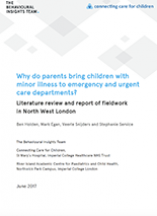What makes a parent decide to bring a child with a minor illness to a hospital paediatric emergency department (PED) or urgent care centre (UCC), rather than go to a GP or pharmacy, or manage the illness themselves at home?
In 2013/14, almost 90% of paediatric emergency department (PED) attendances did not result in the child being admitted to the hospital. The number of PED attendances in England has grown in recent years, rising from 3.9 million in 2008/09 to 5.1 million in 2014/15. , High numbers of non-urgent attendances at PED (i.e. attendances for illness that could have safely been treated elsewhere) increases waiting times, inconveniences families, incurs significant costs to the NHS, and reduces the time hospital staff can spend treating severely ill children.
This report, produced by the Behavioural Insights Team (BIT) in collaboration with the Connecting Care for Children (CC4C) programme and funded by the Health Foundation’s Behavioural Insights Research Programme, addresses this issue. We review the academic literature on why parents attend PED non-urgently, describe the results of our observations and fieldwork conducted in two London hospitals (St. Mary’s PED and Northwick Park UCC), and analyse attendance data at these two hospitals. Ultimately, the information in this report will be used to the design a behaviourally-informed intervention which helps parents manage the health of their children outside the hospital and reduces their need to attend the hospital for non-urgent illness.


